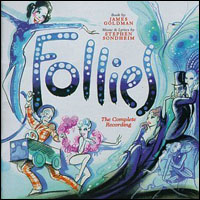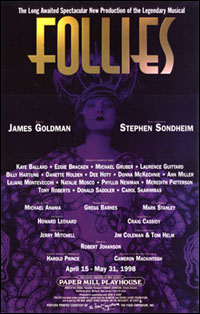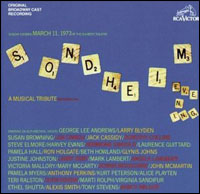
*
The previous On the Record column took us through discussion of the first two of the four currently existing cast albums of Stephen Sondheim's Follies; a fifth cast album, from the revival presently at the Marquis, is due later this month from PS Classics. This column continues the discussion.
(Among the dozens of emails that came in last week was one from a reader who so needed to see the original production in 1971 that he journeyed to the Winter Garden at risk of arrest, sneaking in from Canada and slipping back out again. Well worth it, he said — but I don't suppose it would have been if he'd been imprisoned for evading the draft.)
*
Cameron Mackintosh, who met early success with the 1976 revue Side by Side by Sondheim and unfathomable fortune with Cats, demonstrated his support of Sondheim in 1987 by presenting a lavish London premiere of Follies [First Night OCR CD6019]. This was a somewhat rethought and rewritten version, with Sondheim providing four new songs. Which, alas, takes it out of the running in a comparative view of Follies recordings. Here, Ben sings neither "The Road You Didn't Take" or "Live, Laugh, Love," which I consider two of the all-important songs in the score.
| |
 |
|
| Producer Cameron Mackintosh |
Three of the leads are intriguing performers. Diana Rigg played Phyllis, with Sondheim accommodating her by writing that new song; Julia McKenzie, of Side by Side by Sondheim (and later a dynamic Mrs. Lovett), played Sally. The London Ben was Daniel Massey, who in 1963 gave one of my favorite original cast album performances — opposite the aforementioned Barbara Cook — as Georg in Hal Prince's original production of She Loves Me. Buddy was played by Daniel Healy, who had won an Olivier rockin' the boat as Nicely Nicely Johnson in Richard Eyre's 1982 revival of Guys and Dolls to Ms. McKenzie's Adelaide. All are okay, though none stand out. I'd like to have heard Massey singing Ben's real songs, though.
The only performance on this disc that does stand out, to these ears anyway, is the Carlotta of Dolores Gray. Who, like many of the original Broadway cast, had indeed careered from career to career, only to wind up in her mid-50s with one last chance at a comeback in the London company of Follies.
| |
 |
|
| Cover art for the Paper Mill cast recording |
The Paper Mill Follies [TVT Soundtrax TVT 1030-2] generated scads of comment, pro and con; most importantly, it gave a whole new generation the opportunity to see a full Follies for real. By 1998, there was indeed a new generation of Sondheim fans; Follies was never exactly a show for ten-year-olds, meaning that few people born later than 1959 had the chance to see it at the Winter Garden. The Paper Mill opening was followed by extensive discussions as to whether it could, and should, transfer to Broadway. The answer, ultimately, was no.
The 1998 production lives on in an admirably produced two-disc cast album. Here is the full score, and by full I mean full: the second disc concludes with eight songs cut from the show. ("Ah, But Underneath" was performed at Paper Mill, so "Lucy and Jessie" is included with the cuts along with "Uptown/Downtown" — the first song Sondheim wrote for this never-exactly-conquered spot.) The songs are sung by the actors playing the corresponding roles in the Paper Mill production; the cuts that were heard in Boston use the original orchestrations.
This is icing on the cake for Follies fans. My favorites of the added tracks are "Bring on the Girls," a number for Roscoe and his ghost that was replaced by "Beautiful Girls"; "All Things Bright and Beautiful," a glorious duet for Ben and Sally which has survived — musically — as the haunting theme used in the Prologue; and "Can That Boy Fox-Trot!" This last was replaced during the tryout by "I'm Still Here," a superior song which encapsulates one of the major themes of the show. Still, "Can That Boy Fox-Trot!" is plenty of fun; what's more, Ann Miller — who of course did not perform it onstage at Paper Mill — does a better job with it than she does with its replacement. (Miller seems unable to comprehend the rhythm leading into the bridge of "I'm Still Here." One can only imagine the composer, the conductor and the chorus boys rolling their eyes every time she got it wrong over the course of the six-week run.)
Which brings us to the performances. The music, on the CD, sounds markedly better than on the earlier cast albums; Tunick himself conducts, carefully bringing out every color of his orchestration. (Sondheim was executive producer of the album.) So why does this album rank a couple of rungs below the troubled 1971 recording? The singers, alas.
| |
 |
|
| Poster art for Paper Mill's Follies |
Follies — without a standout Phyllis or Sally (pick one) — is unlikely to soar. No matter how good the band plays. The three major supporting ladies in this case can't quite turn things around. Ann Miller makes a distinctive Carlotta, needless to say; certainly this is one performance you are unlikely to forget. Kaye Ballard sings "Broadway Baby" like an old pro, which she is, though not with the emotional intensity of am Ethel Shutta or Elaine Stritch. Phyllis Newman, meanwhile, repeats her 1985 performance as Stella and gives us a different but equally compelling rendition of "Who's That Woman."
At least a few readers of this column by now might be complaining, why does he always leave out Solange and Heidi and this one and the other? Yes, they are significant pieces of the puzzle, because Sondheim and Goldman wrote the show that way. But the contributions of all the others, aside from the seven characters discussed, always seem like side excursions to me. Solange remembers nights in Paris; in terms of Ben, Sally, Phyllis, Buddy and the metaphorical meanings of the Weismann Follies, so what? Heidi sings her operatic aria, aching for one more kiss (or perhaps one last moment in the spotlight of life). These moments are simply not as pertinent to me as Hattie demonstrating the grit that she had in her 20s and her 70s; Stella searching for the ghost of who she, and by extension all of us, was; or Carlotta holding on through a roller coaster of vicissitudes. To me, these other characters are subsidiary; a phenomenal or poor Solange Lafitte or Emily Whitman will not make or break the show. Follies rises or falls on the seven performances stated, which — by the way — pretty much explains the 2001 Roundabout production.
I also overlook the younger selves of the four protagonists, who are not given flashy material but play important roles throughout the piece. This includes "Waiting Around for the Girls Upstairs," an octet for the leads and their ghosts, which I consider the most important and exciting song in the score. Let it be pointed out that some of these younger ghosts are of considerable interest, like Harvey Evans as the original Young Buddy. (A Young Buddy over 30, but Evans has always appeared considerably younger than he is.) Most intriguing is the group assembled for Avery Fisher Hall. Daisy Prince, daughter of Hal, is Young Sally to the Young Ben of Jim Walton (the original Franklin Shepard in Merrily We Roll Along). The other couple is Howard McGillin and Liz Callaway, whose strong young voices enhance every line they sing.
| |
 |
|
| Cover art for Sondheim: A Musical Tribute |
Live recordings of benefits are rarely instructive, with voracious audience reaction only marring things. Sondheim: A Musical Tribute [RCA 60515-2-RC], though, is very much to the point. Smith and Collins sing their big numbers, "Could I Leave You?" and "Losing My Mind." These are impeccably performed on the 1971 cast album, but the later performances are equally moving. (Smith clearly is enjoying herself.) Collins is joined by McMartin for "Too Many Mornings," here presented in the original extended version which includes the cut introductory section, "Pleasant Little Kingdom."
Of great importance was the until-then vanished "One More Kiss," recreated by Justine Johnston and Victoria Mallory. The 1971 recording studio track of "One More Kiss" eventually surfaced, when the original cast album was reissued on CD, but for 20 years the "Musical Tribute" album was the only place to hear Johnston and Mallory sing their duet. (Mallory was apparently Sondheim's favorite soprano at the time. In 1968 she played Maria — to Kurt Peterson's Tony — in the first major revival of West Side Story, at the New York State Theatre. Follies came next, followed by the role of Anne Egerman in A Little Night Music.)
Even more important, perhaps, was Ethel Shutta's full-length rendition of "Broadway Baby," which had been abbreviated by half on the Capitol album. Shutta sure knows how to work the audience. The CD includes two Follies surprises. Larry Blyden — who had just won a Tony Award for his Hysterium in the 1972 revival of A Funny Thing Happened on the Way to the Forum — shows us that "Buddy's Blues" can indeed be a joy. He is assisted not by two chorus girls, as in the show, but by Ms. McKechnie and an especially flavorful Chita Rivera. Finally, we get the most glorious "I'm Still Here" I've heard. Nancy Walker sings it, rueful, sardonic, and indestructible.
(Steven Suskin is author of the recently released updated and expanded Fourth Edition of "Show Tunes" as well as "The Sound of Broadway Music: A Book of Orchestrators and Orchestrations," "Second Act Trouble" and the "Opening Night on Broadway" books. He also pens Playbill.com's Book Shelf and DVD Shelf columns. He can be reached at [email protected].) *
Visit PlaybillStore.com to view theatre-related recordings for sale.
View highlights from the show:










